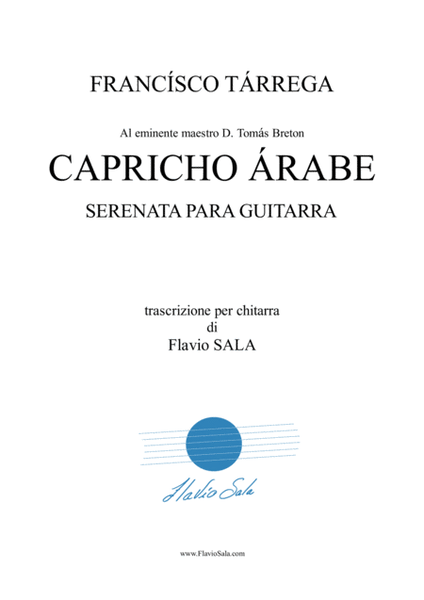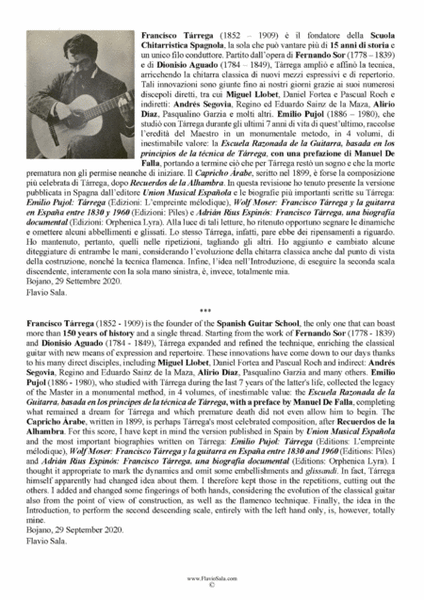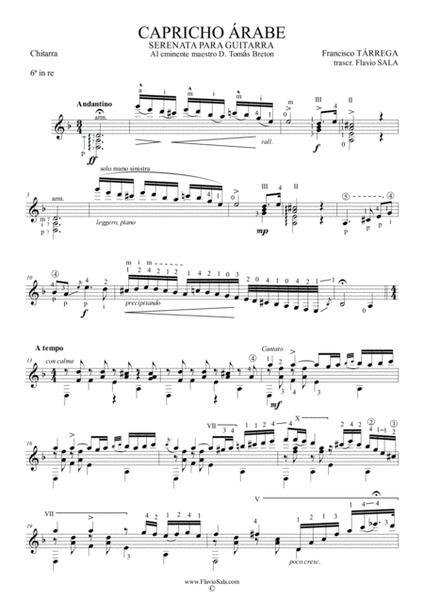CAPRICHO ARABE for guitar by Tarrega - Rev. and fing. by Flavio Sala
 Instant Download
Instant Download
Details
Description
SKU: A0.893142
Composed by Francisco Tarrega (1852-1909). Arranged by Flavio Sala. 20th Century,Romantic Period. Individual part. 6 pages. Flavio Sala #6082531. Published by Flavio Sala (A0.893142).Francísco Tárrega (1852 – 1909) è il fondatore della Scuola Chitarristica Spagnola, la sola che può vantare più di 150 anni di storia e un unico filo conduttore.
Partito dall’opera di Fernando Sor (1778 – 1839) e di Dionisio Aguado (1784 – 1849), Tàrrega ampliò e affinò la tecnica, arricchendo la chitarra classica di nuovi mezzi espressivi e di repertorio. Tali innovazioni sono giunte fino ai nostri giorni grazie ai suoi numerosi discepoli diretti, tra cui Miguel Llobet, Daniel Fortea e Pascual Roch e indiretti: Andrés Segovia, Regino ed Eduardo Sainz de la Maza, Alirio Díaz, Pasqualino Garzia e molti altri.
Emilio Pujol (1886 – 1980), che studiò con Tárrega durante gli ultimi 7 anni di vita di quest’ultimo, raccolse l’eredità del Maestro in un monumentale metodo, in 4 volumi, di inestimabile valore: la Escuela Razonada de la Guitarra, basada en los principios de la técnica de Tárrega, con una prefazione di Manuel De Falla, portando a termine ciò che per Tárrega restò un sogno e che la morte prematura non gli permise neanche di iniziare.
Il Capricho Árabe, scritto nel 1899, è forse la composizione più celebrata di Tárrega, dopo Recuerdos de la Alhambra.
In questa revisione ho tenuto presente la versione pubblicata in Spagna dall’editore Union Musical Española e le biografie più importanti scritte su Tárrega: Emilio Pujol: Tárrega (Edizioni: L’empreinte mélodique), Wolf Moser: Francisco Tárrega y la guitarra en España entre 1830 y 1960 (Edizioni: Piles) e Adrián Rius Espinós: Francisco Tárrega, una biografía documental (Edizioni: Orphenica Lyra).
Alla luce di tali letture, ho ritenuto opportuno segnare le dinamiche e omettere alcuni abbellimenti e glissati. Lo stesso Tárrega, infatti, pare ebbe dei ripensamenti a riguardo. Ho mantenuto, pertanto, quelli nelle ripetizioni, tagliando gli altri. Ho aggiunto e cambiato alcune diteggiature di entrambe le mani, considerando l’evoluzione della chitarra classica anche dal punto di vista della costruzione, nonché la tecnica flamenca. Infine, l’idea nell’Introduzione, di eseguire la seconda scala discendente, interamente con la sola mano sinistra, è, invece, totalmente mia.
Bojano, 29 Settembre 2020.
Flavio Sala.
***
Francísco Tárrega (1852 - 1909) is the founder of the Spanish Guitar School, the only one that can boast more than 150 years of history and a single thread.
Starting from the work of Fernando Sor (1778 - 1839) and Dionisio Aguado (1784 - 1849), Tárrega expanded and refined the technique, enriching the classical guitar with new means of expression and repertoire. These innovations have come down to our days thanks to his many direct disciples, including Miguel Llobet, Daniel Fortea and Pascual Roch and indirect: Andrés Segovia, Regino and Eduardo Sainz de la Maza, Alirio Díaz, Pasqualino Garzia and many others.
Emilio Pujol (1886 - 1980), who studied with Tárrega during the last 7 years of the latter's life, collected the legacy of the Master in a monumental method, in 4 volumes, of inestimable value: the Escuela Razonada de la Guitarra, basada en los principes de la técnica de Tárrega, with a preface by Manuel De Falla, completing what remained a dream for Tárrega and which premature death did not even allow him to begin.
The Capricho Árabe, written in 1899, is perhaps Tárrega's most celebrated.
This product was created by a member of ArrangeMe, Hal Leonard’s global self-publishing community of independent composers, arrangers, and songwriters. ArrangeMe allows for the publication of unique arrangements of both popular titles and original compositions from a wide variety of voices and backgrounds.
Digital Downloads are downloadable sheet music files that can be viewed directly on your computer, tablet or mobile device. Once you download your digital sheet music, you can view and print it at home, school, or anywhere you want to make music, and you don’t have to be connected to the internet. Just purchase, download and play!
PLEASE NOTE: Your Digital Download will have a watermark at the bottom of each page that will include your name, purchase date and number of copies purchased. You are only authorized to print the number of copies that you have purchased. You may not digitally distribute or print more copies than purchased for use (i.e., you may not print or digitally distribute individual copies to friends or students).



 Share
Share